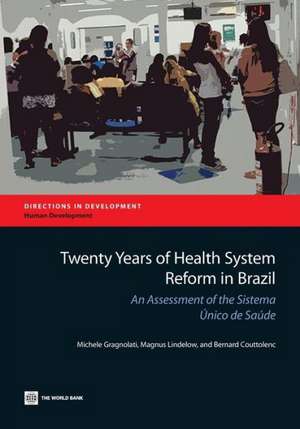Twenty Years of Health System Reform in Brazil: An Assessment of the Sistema Unico de Saude: Directions in Development
Autor Michele Gragnolati, Magnus Lindelow, Bernard Couttolencen Limba Engleză Paperback – 26 iun 2013
Din seria Directions in Development
-
 Preț: 168.03 lei
Preț: 168.03 lei -
 Preț: 150.00 lei
Preț: 150.00 lei -
 Preț: 238.91 lei
Preț: 238.91 lei -
 Preț: 241.58 lei
Preț: 241.58 lei -
 Preț: 199.96 lei
Preț: 199.96 lei -
 Preț: 270.95 lei
Preț: 270.95 lei -
 Preț: 232.38 lei
Preț: 232.38 lei -
 Preț: 239.46 lei
Preț: 239.46 lei -
 Preț: 232.74 lei
Preț: 232.74 lei -
 Preț: 287.12 lei
Preț: 287.12 lei -
 Preț: 275.80 lei
Preț: 275.80 lei -
 Preț: 235.42 lei
Preț: 235.42 lei -
 Preț: 271.39 lei
Preț: 271.39 lei -
 Preț: 228.89 lei
Preț: 228.89 lei -
 Preț: 242.55 lei
Preț: 242.55 lei -
 Preț: 235.04 lei
Preț: 235.04 lei - 5%
 Preț: 263.46 lei
Preț: 263.46 lei -
 Preț: 232.74 lei
Preț: 232.74 lei -
 Preț: 168.86 lei
Preț: 168.86 lei -
 Preț: 243.15 lei
Preț: 243.15 lei -
 Preț: 277.53 lei
Preț: 277.53 lei -
 Preț: 205.52 lei
Preț: 205.52 lei -
 Preț: 170.23 lei
Preț: 170.23 lei -
 Preț: 194.48 lei
Preț: 194.48 lei -
 Preț: 279.67 lei
Preț: 279.67 lei -
 Preț: 319.81 lei
Preț: 319.81 lei -
 Preț: 275.03 lei
Preț: 275.03 lei -
 Preț: 199.15 lei
Preț: 199.15 lei - 5%
 Preț: 222.77 lei
Preț: 222.77 lei -
 Preț: 319.81 lei
Preț: 319.81 lei -
 Preț: 319.05 lei
Preț: 319.05 lei -
 Preț: 163.31 lei
Preț: 163.31 lei -
 Preț: 232.16 lei
Preț: 232.16 lei -
 Preț: 233.51 lei
Preț: 233.51 lei -
 Preț: 322.93 lei
Preț: 322.93 lei -
 Preț: 199.76 lei
Preț: 199.76 lei -
 Preț: 278.08 lei
Preț: 278.08 lei - 5%
 Preț: 192.36 lei
Preț: 192.36 lei -
 Preț: 237.32 lei
Preț: 237.32 lei - 5%
 Preț: 189.61 lei
Preț: 189.61 lei -
 Preț: 277.53 lei
Preț: 277.53 lei -
 Preț: 170.23 lei
Preț: 170.23 lei -
 Preț: 238.14 lei
Preț: 238.14 lei -
 Preț: 203.61 lei
Preț: 203.61 lei -
 Preț: 272.69 lei
Preț: 272.69 lei - 5%
 Preț: 181.09 lei
Preț: 181.09 lei -
 Preț: 237.17 lei
Preț: 237.17 lei -
 Preț: 207.43 lei
Preț: 207.43 lei -
 Preț: 204.11 lei
Preț: 204.11 lei
Preț: 231.19 lei
Nou
Puncte Express: 347
Preț estimativ în valută:
44.24€ • 46.02$ • 36.53£
44.24€ • 46.02$ • 36.53£
Carte tipărită la comandă
Livrare economică 12-26 aprilie
Preluare comenzi: 021 569.72.76
Specificații
ISBN-13: 9780821398432
ISBN-10: 0821398431
Pagini: 128
Dimensiuni: 178 x 254 x 7 mm
Greutate: 0.24 kg
Ediția:New.
Editura: World Bank Publications
Seria Directions in Development
ISBN-10: 0821398431
Pagini: 128
Dimensiuni: 178 x 254 x 7 mm
Greutate: 0.24 kg
Ediția:New.
Editura: World Bank Publications
Seria Directions in Development
















